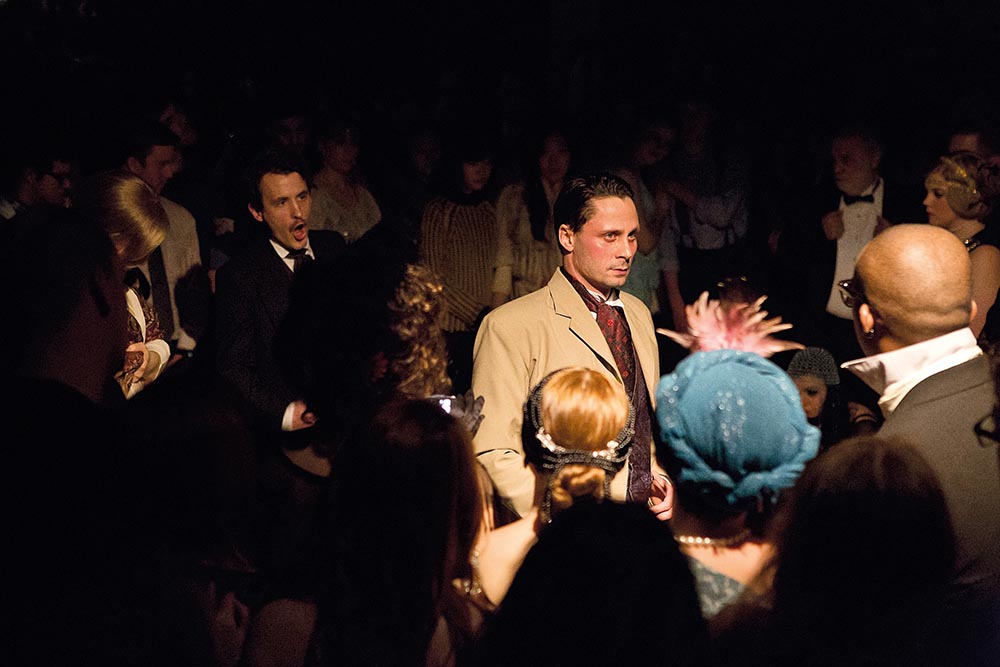Considering the controversial family that he came from, it makes sense that the club Edwin Booth founded would also generate some drama of its own. Money woes and membership infighting have been a staple of the club’s history, as much a part of its aura as “pipe nights,” evenings traditionally spent smoking and honoring individual artists, and competitive pool-shooting. The Players almost went bankrupt in the mid-20th century, and membership fell during the Depression and the World Wars. The club had to sell two Sargent paintings in past years to generate revenue (the painting of Booth hanging above the fireplace is a replica).
And there have been tales of personal intrigue, such as Sarah Bernhardt getting stuck in the club’s elevator in 1911 (the lift is now called, a plaque on the wall announces, the “Sarah Bernhardt room”), or the mysterious thief who stole miniatures of Junius Booth, Edwin’s father, and a few of the club’s paintings from the Writing Room in 1970.
In 2013, the Players experienced another real-life drama. On the brink of closing, $1.5 million in debt and losing money, it faced a class-action lawsuit from its service workers, and construction to restore the facade of the house had to be halted because of lack of funds. Executive director John Martello, who had supervised the club for nearly 20 years, resigned (though rumors have it that he was forced out) after being accused by former and current members of giving away memberships and venue rentals for free. The club seized the occasion to reconstitute its executive board—two-thirds of the current board members are new, and the club recently elected a new president and created the role of chairman.
“Since last June, a lot of members have put in a lot of hours to redo the constitution, settle up the committee’s responsibilities and change some of the leadership,” says actress Shana Farr, chair of the events committee, which has been working to bring more programming to the club. “I definitely feel a difference from when I first joined two years ago.”

Michael Smith, hired last October as general manager, now oversees the Players $3-million budget and is confident that the club is on the right track. The facade restoration has been finished; the club’s outstanding debt is “a lot less debt than most city clubs,” Smith contends during a conversation in his office, down the hall from Edwin’s bedroom. Now the club is trying to lure in new members, decreasing its initiation fees from $2,000 to $125 (annual memberships still run $2,000). The paying membership roster, according to Smith, stands at 425 and growing, with an influx of new members taking advantage of the 125th-anniversary discount. “If you get them in at a lower price, one day they’ll pay more dues, because actors obviously don’t make much money initially,” he reasons. In its heyday, the Club boasted 1,100 members. Those kinds of numbers are now the goal for Smith.
The club’s need for new energy and younger voices is also reflected in its willingness to open its doors to nonmembers via a production such as Brothers Booth, which fills the halls that Edwin Booth and Mark Twain walked through with theatregoers of all ages and backgrounds. The club also hosts play readings, jazz nights, talks and cabarets (Stageworks recently launched its Live from Gramercy Park series there). “In a perfect world, there would be something here every single night,” Barra enthuses.
For her part, von Buhler says Brothers Booth is her way of helping stabilize the club; she is now a member. “I want this to remain a club—I don’t want it to become somebody’s apartment or house,” she says with some heat. “I’ve belonged to other clubs, but I’ve never felt as welcomed as I do here, at this place.” There’s also a provocative family connection: Buhler’s grandfather Frank Spano (whose story is told in the original Speakeasy Dollhouse) frequented the club back in the days of Prohibition. “My grandfather provided this place with bootleg!”


